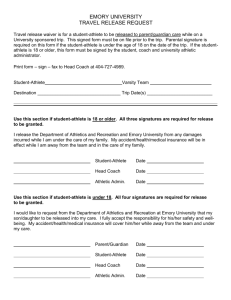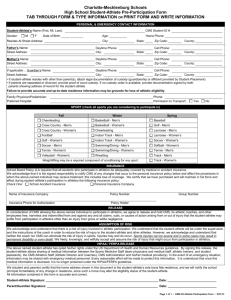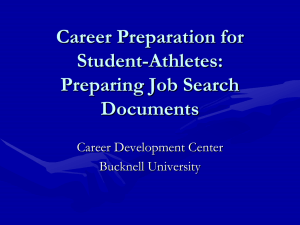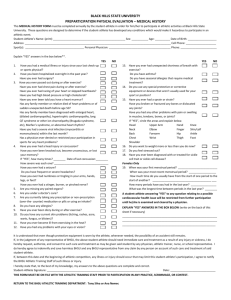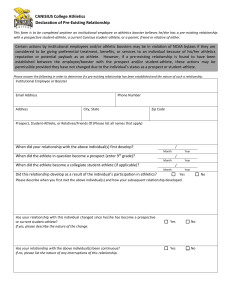The Policy and Procedures for The Florida State University
advertisement
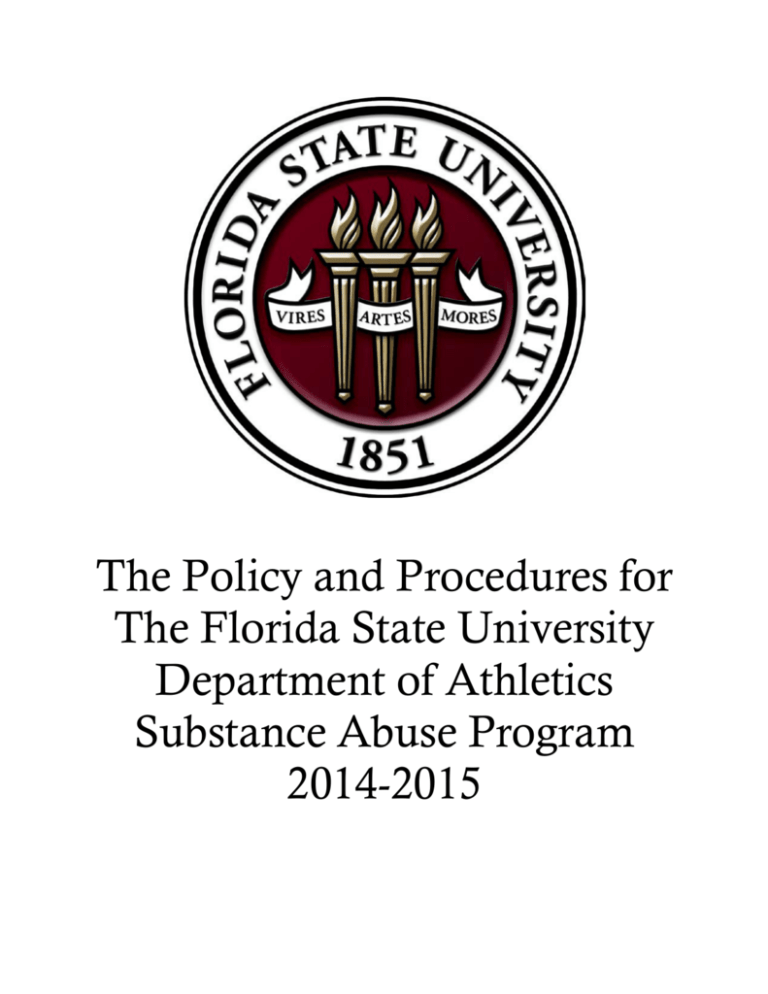
The Policy and Procedures for The Florida State University Department of Athletics Substance Abuse Program 2014-2015 Table of Contents Introduction …………………………………….. Substance Abuse Committee………....………… Drug Testing………………………...………….. Consequences…………………………..……….. Flow Chart………………………………………. Self-Referral……………………………………… Good Behavior Opportunity………………….... Counseling…………………………….…………. Appeals Process……………………………….... NCAA Program Testing Program……………... Dietary Supplements……………………………. Summary………………………………...………. Good Behavior Opportunity Application……… Advisory Committee……………….……….…... 2 3 4 4-6 6-8 9 10 10 10 11 11-12 12 12 13 14 I. Introduction The Athletic Department of the Florida State University recognizes that substance abuse is a national concern. It is the department’s intent to help provide a safe, healthy, and drug-free atmosphere in which student-athletes can experience and grow as students, and most importantly, as human beings. The lives of many men, women and children are being negatively influenced by our society’s unhealthy relationship with alcohol, tobacco and illicit drugs. College is a time when important decisions are often made regarding career, relationships, etc. Additionally, the student-athlete has many other stresses associated with being an athlete at a major university. The pressures of training, practice, time management, and notoriety, accompanied by the other pressures of adjusting to a large university often far from home, can sometimes make the temporary relaxation promised by drug use very attractive. The Athletic Department is committed to the development and enactment of a substance abuse policy designed to assist studentathletes meet the demands of both academic and athletic pursuits. It is with this philosophy in mind that the Athletic Department has developed a Substance Abuse Policy that has the following goals: 1. To provide current, factual information to all student-athletes regarding drug use/abuse. 2. To identify as quickly as possible those student-athletes who are abusing substances, or who are at high risk to abuse substances, and provide them with the professional assistance they require. 3. To develop and maintain an ethical, responsible drug testing program designed to act as both a deterrent to drug/alcohol abuse and as a method of identifying student-athletes who may already be involved with substance abuse. 4. To enhance the well-being of FSU student-athletes and ensure, as much as possible, their safety. 5. To provide a safe environment for intercollegiate athletics competition. By accomplishing these goals the Athletic Department is fulfilling a responsibility it has towards the student-athletes who have been recruited to pursue their academic and athletic careers at Florida State University. A. General Information Any athlete, scholarship or walk-on, in order to participate on an athletic team at Florida State University, will be asked to sign a consent form stating that they have read and understand the substance abuse policy and agree to comply with the policy and the consequences of any positive tests. The athletics drug policy will be reviewed at the beginning of the Fall semester, including the frequency of the student- athlete being drug tested by FSU and/or the NCAA. Drug testing involving championship games/events in their sport will also be explained. Further discussion will also highlight what happens if a positive drug test does occur. Family involvement, counseling services, suspensions and dismissals will be covered at this time. B. Substance Abuse Education The basic thrust of the Athletic department’s Substance Abuse Program is one of prevention. An essential component of any prevention program is education concerning drug testing procedures, the substances themselves and the consequences resulting from problems in this area that do develop. It is the goal of the Athletic Department to ensure that accurate information regarding alcohol and drug abuse is disseminated to the student-athletes of Florida State University. The goal of the educational component of the Substance Abuse Program is to ensure, as much as possible, that no student-athlete makes an unhealthy decision due to ignorance regarding their use of alcohol or drugs. 3 II. Substance Abuse Committee A Committee shall be formed which has its primary function the development and implementation of the Substance Abuse Policy. The committee will be comprised of at least the following persons: Senior Executive Associate Director of Athletics, Director of Compliance, Director of Student Services, one team physician, one substance abuse professional, Director of Sports Medicine, Senior Associate Director of Sports Medicine-Head Football Athletic Trainer, Drug Testing Coordinator, Behavioral Health Coordinator, Director of Student-Athlete Academic Services, president of Student Athlete Advisory council, and a university legal advisor, when necessary. These individuals will be approved by the Director of Athletics. The committee shall be empowered to review the athletic Department’s substance abuse policies and testing procedures, as it deems necessary. The committee will not be privy to any confidential information regarding individual drug test results, with the exception of the Substance Abuse Executive Committee members. A chairperson for the committee will be appointed by the Director of Athletics. This individual will convene and chair all substance abuse committee meetings, and will author a summary report to the Director of Athletics regarding all drug testing done during the previous academic year. The committee will meet no less than once each academic year in its effort to review current policy and procedures. III. Drug Testing A. General Information Drug testing performed by the Florida State University Department of Athletics is done so in correlation with Aegis Sciences Corporation, a SAMSHA certified laboratory, and are performed in the Wilma Rudolph Sports Testing Laboratory. The basic testing profile which will be used for all tests is the “Zero-tolerance 4-Drug Class Profile” #00304. This profile includes but is not limited to the following four classes: I. Amphetamines a. Amphetamine b. Methamphetamine c. MDMA d. MDEA e. MDA f. Phentermine g. PMA II. Opiates a. Codeine b. Dihydromorphone c. Hydromorphone d. Hydrocodone e. Morphine f. Oxycodone g. Oxymorphone III. Marijuana IV. Cocaine & Crack Cocaine V. Specimen Validity a. Nitrites b. Chromates c. Specific Gravity 4 At any time and at random, certain student-athletes may also be tested for synthetic cannabinoids, alcohol, and anabolic steroids. The random selection of student-athletes is performed by computer based randomization programs through Aegis Sports Testing Services. Some student-athletes will be selected for repeat testing because of entry into the Substance Abuse Program as the result of a prior positive test. Once the list of random selections and repeat selections is generated, the athletic trainer for each sport will notify the student-athlete of the selection and the student-athlete will then sign a form of notification and provide their current cell phone number, or number where they can be reached at the time of the test. Student-athletes are to report for testing at the time and location stated on the notification form. When the student-athlete reports for testing their identification is confirmed by photo identification. The chain of custody form is completed and the student-athlete is identified on the form only by the unique identification number that is created by Aegis Sports Testing Services, not their name. This unique number remains the same for the student-athlete for his/her entire eligibility as a studentathlete at Florida State University. Certified collection of specimens is done by male and female collectors from outside laboratories arranged by Aegis Sports Testing Services and approved by FSU Sports Medicine. The studentathlete is observed providing the sample and the sample is processed using strict chain of custody procedures in order to guarantee that there is no tampering with or manipulation of the sample. Samples are then shipped to the Aegis Sports Testing Services laboratory in Nashville, Tennessee for testing. When extenuating circumstances arise, urine samples can be collected by the Drug Testing Coordinator or his/her designee. Once laboratory testing is completed, Aegis Sports Testing Services notifies the Director of Sports Medicine as well as the Associate Director of Sports Medicine and the Drug Testing Coordinator via email that results are ready to be viewed at the secure Aegis Sports Testing website. At that time results are downloaded to the computer of any of the three notified sports medicine staff members and the results are imported into a secure program that matches the student-athlete with his/her unique identification number. 1. For the initial drug screening, urine samples will be processed using enzyme immunoassay testing methods. All Non-Negatives will be confirmed positive through gas chromatography/mass spectrometry or by liquid chromatography/mass spectrometry testing methods. 2. The drug test threshold values for screening and confirmation are consistent with the Zero Tolerance Drug Testing program used by Aegis Sciences except the Marijuana threshold which is the standard used by SAMSHA (Substance Abuse & Mental Health Services Administration). A sample is considered positive if the levels exceed the confirmation threshold. 3. The screening and confirmation threshold utilized in the FSU Substance Abuse Program are outlined below: Drug Class Drug Test Threshold Table (Screen/Confirm ng/mL) Amphetamines 500/250* Cocaine/Crack 100/50 Marijuana 15/5 Opiates (Narcotics) 100/100 *Also includes MDMA (Ecstasy), MDEA (Eve), MDA and PMA at a 250 ng/mL screening threshold and a 100 ng/mL confirmation threshold. 5 All samples analyzed by Aegis Sciences will be normalized using the specific gravity standard 1.020 set by the World Anti-Doping Association (W.A.D.A.). A result that indicates a specific gravity below this standard is considered dilute. Should a student-athlete’s sample be deemed dilute, the student-athlete is notified as soon as possible after this information is received and the studentathlete will be re-tested at the earliest available opportunity. Two consecutive dilutes will be counted as a positive test. This re-test collection may be performed by a member of the sports medicine staff. The procedures for collection and chain of custody will be the same as if performed by a member of an outside laboratory. B. Substance Abuse Testing Frequency All first year incoming student-athletes will be drug tested within the first 7-14 days of their eligibility. This is considered to be part of the first year athletic department pre-participation physical examination. Random drug testing will then occur throughout the year on a bi-weekly basis for all student-athletes of all intercollegiate sports. C. Adulteration/False Urine Samples/Masking Agents Student-Athletes that are observed using or attempting to use an adulterating substances, a false urine sample, or a urine masking agent at the time they are attempting to produce a urine sample may be faced with dismissal from the athletics program at Florida State University regardless of having already been entered into the Substance Abuse Program. D. Arrest/Conviction for Illegal Substances or Alcohol An arrest or conviction for the use of an illegal substances or alcohol such as D.U.I., public intoxication, or possession will automatically count as a positive test and the athlete will be penalized both within the guidelines of the substance abuse program, as well as whatever the legal system dictates, and the Athletic Director and head coach deems appropriate. IV. Consequences After a student-athlete tests positive and has been assessed by the drug abuse professional, their situation is then discussed with the Director of Athletics, supervising athletic trainer, coach, and the director of the Substance Abuse & Mental Health Program. They will then develop a plan of action for dealing with this specific student-athlete. Things to be considered when developing consequences include: number of prior positive test results, the specific drug for which the student-athlete tested positive, the student-athlete’s general deportment here at the university, the student-athlete’s respective team rules, and the nature and extent of the student-athlete’s relationship with drugs and/or alcohol. The consequences are not limited by precedent and will be designed to be appropriate for each individual situation. The Director of Athletics, Head Coach, and the Substance Abuse Committee may elect for additional consequences should there be other circumstances involved. Each student-athlete’s case is handled on an individual basis. In any case, the consequences shall not be lesser than those established by the Department’s policy. This may include dismissal from the athletics program following the 1st or 2nd offense. The goal is to evaluate and identify potential high risk student-athletes to plan a course for early intervention and prevention plans. When freshman first enter Florida State University through the summer bridge program, each student-athlete will receive an evaluation by a trained professional. If student-athlete does not participate in Summer Bridge, a trained professional will speak to each sport to 6 identify potential "at­ risk" issues among individual student-athletes. Counseling sessions will be scheduled as recommended by trained professional. Regardless of the outcome, the Athletic Department is committed to handling any of these situations in a professional and confidential manner. The welfare of the student-athlete is the primary concern. The Director of Athletics retains the right to adjust any consequences to the Substance Abuse Committee’s recommendations on all positive test results. Zero-Tolerance 4-Drug Class Panel 1. A first violation for substances included in the Zero-Tolerance 4-Drug Class Panel or Synthetic Cannabinoids will result in notification of the Director of Athletics, head coach, Substance Abuse Executive Committee (SAEC) and parents/guardians of the student-athlete. The student-athlete must sign a Substance Abuse Policy Violation Notification Agreement that they have been informed of the positive test and understand the terms of the violation. A mandatory assessment with a substance abuse professional is required once the positive result reading is received. Counseling sessions, treatment, and a student accountability plan will be based on the recommendation of the substance abuse professional. Following the initial positive test, the student-athlete will undergo 6-week treatment period that includes, but not limited to, follow-up testing to track the positive substance levels in the student-athlete. After the 6-week treatment period, the student-athlete will be subject to the normal testing procedures. If the student-athlete is non-compliant with their student-accountability plan set by the SAEC and the substance abuse professional, the student-athlete will be dismissed from the treatment period and will resume normal testing procedures. 2. A second violation for substances included in the Zero-Tolerance 4-Drug Class Panel or Synthetic Cannabinoids will result in notification of the Director of Athletics, head coach, Substance Abuse Executive Committee (SAEC) and parents/guardians of the student-athlete, as well as a suspension from competition. The student-athlete must sign a positive substance offense notification for Substance Abuse Policy Violation Notification Agreement that they have been informed of the positive test and understand the terms of the violation. The student-athlete will meet with at least two members of the SAEC to determine appropriate treatment and to develop and implement a student accountability plan. Assessment and counseling will continue based on the recommendations of the substance abuse professional. Following the second offence, the studentathlete will undergo 6-week treatment period that includes, but not limited to, follow-up testing. Once positive substance levels reach zero, the student-athlete will be subject to the normal testing procedures. The duration of suspension is to be determined by the SAEC and the Head Coach and will be influenced by the length of the season for the specific sport in which the student-athlete is involved. The student-athlete’s parents/guardians will be notified. If the student-athlete is noncompliant with their treatment plan set by the SAEC and the substance abuse professional, the student-athlete will be dismissed from the treatment period and will resume normal testing procedures. 3. A third violation for substances included in the Zero-Tolerance 4-Drug Class Panel or Synthetic Cannabinoids will result in notification of the Director of Athletics, head coach, Substance Abuse Executive Committee (SAEC) and parents/guardians of the student-athlete, and will be the basis for dismissal from the athletics program at Florida State University. The student-athlete may elect to enter into an in-patient rehabilitation center for a minimum of 28 days and personally incur the cost. Upon successful completion of the rehabilitation program and with application and approval of the committee, the student-athlete may be reinstated. If reinstated, the student-athlete will resume to the normal testing procedures. 7 Anabolic Steroids 1. The minimum consequences for a first violation for anabolic steroids, abnormal testosterone/ epitestosterone ratio, or any other anabolic compounds will be automatic one calendar-year suspension from competition, an assessment with a substance abuse professional, and repeat testing until anabolic steroid levels are zero or testosterone/epitestosterone ratio is within normal limits. The Director of Athletics, head coach, and the student-athletes’ parent or guardian will be notified. 2. A second violation for anabolic steroids, testosterone/epitestosterone ratio, or any other anabolic compounds will be the basis for dismissal from the athletic program at Florida State University. 8 4-Drug Class Panel PRIOR TO NOTIFICATION Self- Referral 1st Violation Counseling Parents/Guardians ARE NOT notified Plan determined by drug counselor Any positive drug tests after the 6-week period will result in a 2nd violation Parents/Guardians ARE notified by SA w/ administrator present SA may be tested weekly until drug tests levels return to zero Continue monitored testing for 6 weeks 2nd Violation Suspension from team competition TBD by SAEC and Head Coach Meet w/ Substance Abuse Committee to set guidelines for treatment and SA accountability plan SA may be tested weekly until drug test levels return to zero Continued counseling sessions based on recommendations of counselor Any positive drug tests after levels return to zero will result in a 3rd violation Once levels return to zero, SA will be subject to normal testing procedures 3rd Violation SA is dismissed from the squad SA elects to enter in-patient rehab center for a minimum of 28 days and personally incurs the cost Successful completion of the rehab program and with application and approval of the SAEC, SA may be reinstated Normal drug testing procedures resume 9 Self- Referral Program Student-athletes will have the opportunity, one time during their intercollegiate athletic career, to voluntarily identify themselves as having used an illegal drug prior to submitting a specimen for a Florida State University drug screening test. This opportunity cannot be invoked after the student-athlete has been notified of being selected for drug testing, only before a notification. The Director of Athletics, head coach, team physician, Director of Sports Medicine, or Associate Director of Sports Medicine must be informed by the student-athlete that he/she would like to invoke the Self-Referral program prior to any Florida State drug testing notification. Once invoked, drug testing will occur to determine a baseline (Ng) nanogram number for retesting purpose. As a result of declaring for the Self-Referral, a positive test will not count as an offense toward the student-athlete in regards to the Substance Abuse Program’s consequences. Should the drug test result be negative, the one-time self-referral option is not returned to the student-athlete for use again in the future. The Director of Athletics, the head coach, the team physician, and the Director of Sports Medicine will be notified, but notification of the student-athletes parents will not be required. Any student-athlete who uses the Self-Referral program will be required to meet with the designated substance abuse counselor and complete appropriate counseling and rehabilitation as outlined in the Substance Abuse Program. Should the drug test after a self-referral be positive, testing will resume every two weeks until the positive substance levels reach zero. Failure to comply with this program will cause the self-referral to be revoked and the positive drug test being reinstated and considered as an offense in regards to consequences. Good Behavior Opportunity If a student-athlete has a positive drug test that results in a first or second violation, they have the opportunity to have a violation removed. The student-athlete must be in compliance with the treatment program, and have had at least 12 consecutive negative drug tests over a minimum six-month period. If this is successfully completed, the student-athlete may complete a Good Behavior Opportunity application (see page 11) to have one of their violations removed from their record. The application will be reviewed by the Substance Abuse Committee, including the substance abuse professional. This is only available one time during the student-athlete’s athletic career. V. Counseling If a student-athlete is required to receive counseling and/or education because of a positive test, they will be referred to a substance abuse professional. The substance abuse professional will make the determination of where the student-athlete will undergo substance abuse counseling/education. This can be at a facility off-campus as well as at the Student Counseling Center on Campus. If a student-athlete wishes to receive private professional help off-campus, this can also be arranged by the substance abuse professional. However, any expenses incurred with the arrangement will most likely be the responsibility of the student-athlete and their family. If a referral into a residential treatment program is appropriate, these arrangements will be made by the specialist in substance abuse. It should be noted that any counseling is considered by the Athletic Department to be a confidential matter between the student-athlete and the counselor. The Athletic Department may however request confirmations that the student-athlete is attending their sessions. In the event that a coach, teammate, or administrator suspects or is concerned about a studentathlete’s substance abuse, they may refer the student-athlete to their respective athletic trainer. The athletic trainer will then notify at least one member of the SAEC, and the student-athlete will be set up for substance abuse counseling. The student-athlete will meet with the substance abuse professional to begin treatment and to develop and implement a student accountability plan. 10 VI. Appeals If a student-athlete has an additional positive substance abuse test result after a second offense, Florida State University allows a head coach to appeal on behalf of the student-athlete. 1. The Substance Abuse Executive Committee will review the case and make a recommendation to the Director of Athletics regarding the appeal. a. Their decision whether or not to allow an appeal to proceed is final and binding. 2. Appeals will only be heard on the basis of protocol failure or other unusual circumstance justifying the appeal. 3. Maintaining athletic scholarship during the appeal phase is at the discretion of the Director of Athletics. 4. A student-athlete who has requested an appeal may not participate in any team activities or competition until the appeal has been decided upon. a. An appeal hearing must be requested and considered within two weeks of the additional offense. b. If the appeal is allowed to proceed, the quality of the appeal will be considered by the Substance Abuse Appeals Committee. c. The Substance Abuse Appeals Committee will be made up of the Director of Athletics and three members of the Substance Abuse Committee (designated by the Director of Athletics). 5. If the Substance Abuse Appeals committee allows the restoration of eligibility, the restoration will be based on full compliance of Department of Athletics rules and regulations for the remainder of the student-athlete’s enrollment and participation at Florida State University. a. SAEC may impose additional conditions upon reinstatement that are binding continuing conditions for the student-athlete’s reinstatement to full eligibility. 6. An accepted appeal will result in normal substance abuse testing procedures for the studentathlete. If an institutional or NCAA drug test reveals a banned substance at any time, the student-athlete will be permanently ineligible without further rights to appeal. VI. NCAA Program Testing Program Along with the Athletic Department at Florida State University, the NCAA also has a drug testing program. Starting in August of 1990, their drug testing program includes the following: NCAA DRUG TESTING FOR 2010-11 Preseason Testing In-Season Testing Post-season Testing 1-A and 1-AA Football Yes Yes Yes Other Sports Yes Yes Yes Samples collected as a part of the post-season program will be analyzed for substances from all NCAA banned drug categories. The Athletic Department at FSU will ensure all student-athletes are informed as to what those categories include. NCAA sanctions for positive drug test results are also new, starting August 1, 1990. The first time a student-athlete tests positive for any banned substance during an NCAA drug test, they will be ruled ineligible for all competition (regular and post-season) in all sports for no less than one calendar year. 11 The period of ineligibility begins at 12:01 A.M. the day the specimen was provided or was to be provided. The sanctions are the same regardless of whether or not the positive drug test was obtained at an NCAA Championship or as part of the year-round testing program. Student-athlete reinstatement for any team activity will be subject to a decision by the substance abuse committee. All student-athletes who are ruled ineligible as a result of a positive drug test and who will be eligible for eligibility restoration will be subject to NCAA testing at any time during their period of ineligibility. In addition, all student-athletes who are ruled ineligible will be subject to a mandatory exit drug test during the last month of their minimum period of ineligibility. VII. Dietary Supplements Dietary supplement use is prevalent among college athletes. Claims of improved performance, quickened recovery periods, and increased energy from products that are marketed as over the counter, safe and effective are confusing and often erroneous. Many compounds are not subject to the strict regulations set by the U.S. Food and Dietary Administration. The ingredients in dietary supplements may not be accurately revealed and may contain impurities or substances banned by the NCAA. Widespread use of dietary supplement without accurate knowledge of effects or misinformation about ingredients may have adverse reactions and could result in a positive NCAA drug test. It is highly recommended that studentathletes seek the guidance of an Athletic Department Certified Athletic Trainer or nutrition specialist prior to considering using any type of supplement not already provided by the Florida State University Department of Athletics. VIII.Summary The Athletics Department of The Florida State University is committed to its concern for the welfare of the student-athlete. With its comprehensive policy consisting of education, testing, intervention, and counseling, the department is taking a positive step towards maintaining a healthy atmosphere for the pursuit of excellence in both academics and athletics. All efforts will be made to guarantee a healthy and positive experience for student-athletes who choose to attend the Florida State University. 12 Good Behavior Opportunity Application If a student-athlete has a positive drug test that results in a first or second violation, they have the opportunity to have a violation removed. The student-athlete must be in compliance with the treatment program, and have had at least 12 consecutive negative drug tests over a minimum six-month period. If this is successfully completed, the student-athlete may complete this Good Behavior Opportunity application to have one of their violations removed from their record. The application will be reviewed by the Substance Abuse Committee, including the substance abuse professional. This is only available ONE TIME during the student-athlete’s athletic career. NAME: SPORT: DATE: DATE OF MOST RECENT POSITIVE DRUG TEST (approximately): In your own words, why do you think you should have a substance abuse violation removed? I, , promise to hold myself to the same standard that I have worked to reestablish over the last couple months. My actions and behavior not only reflect on myself personally, but my family, my team, and the university. I will continue to follow my treatment plan as discussed. I understand that the removal of a violation does not exempt me from normal drug testing procedures including consequences determined by the athletics administration and coaches. Student-Athlete Signature Date Below Section Completed by Substance Abuse Committee ONLY STATUS OF APPLICATION: Approved Substance Abuse Executive Committee Representative Signature Denied Date 13 2014-2015 Advisory Committee Chairman: Kris Stowers, M.D.* Team Physician Monk Bonasorte* Senior Executive Associate Athletic Director Greg Beaumont Associate Athletic Director-Academic Services Jim Curry Associate Athletic Director- Compliance Robin Gibson, ATC, LAT* Director of Sports Medicine Dr. Keely Kaklamanos, Ph.D Licensed* Psychologist, Addiction Specialist Nick Pappas, ATC, LAT* Athletic Trainer- Drug Testing Coordinator Jake Pfeil, MS, ATC, LAT* Associate Director of Sport Medicine- Head Football Athletic Trainer Julie Kruessel, MS, ATC, LAT* Athletic Trainer- Behavior Health Coordinator TBD Student Athlete Advisory Council President Florida State University General Council as needed *Substance Abuse Executive Committee For More information, please call (850) 644-2648 Updated July 30, 2014 14
